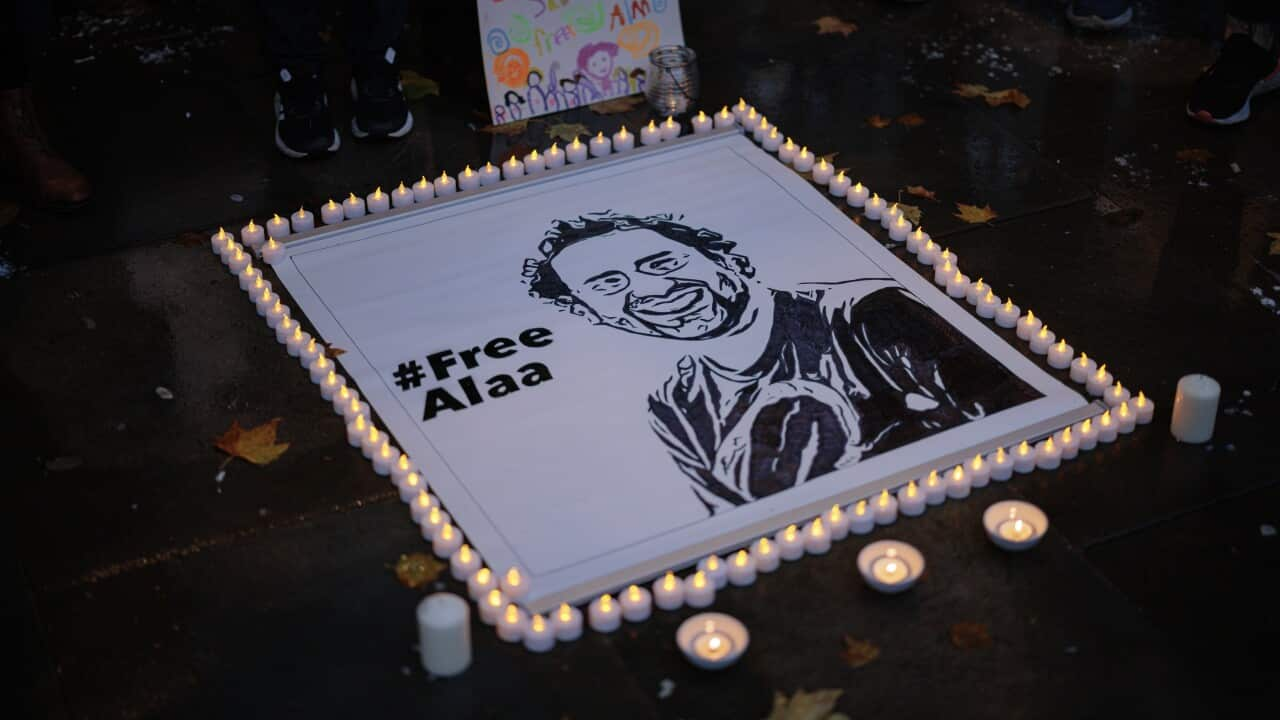Key Points
- Alaa Abd el-Fattah has been eating just 100 calories a day during his hunger strike against his detention and prison conditions.
- The pro-democracy activist is escalating his protest to coincide with the start of COP27.
- UK Prime Minister Rishi Sunak says he will raise the case with Egypt's president.
Since April, pro-democracy activist Alaa Abd el-Fattah has been protesting his most recent detention in an Egyptian jail by barely eating and has said he will now stop drinking water.
Abd el-Fattah, a British-Egyptian who rose to prominence in the 2011 Egyptian uprising, timed the escalation in his hunger strike to coincide with , COP27, which is being held in Egypt.
New UK Prime Minister Rishi Sunak has told Abd el-Fattah’s family, in a letter, that he will raise the case with Egyptian President Abdel Fattah al-Sisi but Abd el-Fattah’s sister Sanaa Seif has told Sky News in the UK that she hopes it will be more than just ‘lip service.’
Mr Sunak’s letter, which his office has confirmed, stated the British government had raised the matter with Mr al-Sisi several times.
"I will continue to stress to President Sisi the importance that we attach to the swift resolution of Alaa's case and an end to his unacceptable treatment," Mr Sunak wrote.
The Secretary General of Amnesty International, Agnes Callamard, has called for Abd el-Fattah’s immediate release, warning if he was not released the outcome could be “a death that could have been prevented.”

Another of Alaa Abd el-Fattah's sisters, Mona Seif, (centre), at a protest in London on Sunday seeking her brother's release. Source: Getty / Anadolu Agency
Abd el-Fattah has spent much of the past 11 years in prison, most recently having been sentenced to five years in jail in December 2021 for ‘spreading false news.’
He had previously been imprisoned for protesting without permission.
Abd el-Fattah has been eating just 100 calories a day during his hunger strike against his detention and prison conditions.
Ms Seif has been staging a sit-in outside the Foreign and Commonwealth Development Office in London in an attempt to force the British government to intervene and help her brother.

Climate activists Greta Thunberg and Andreas Magnusson visit the sit-in for Alaa Abd El-Fattah outside the Foreign and Commonwealth Development Office in London. Source: Getty / Hollie Adams
It had been hoped gaining British citizenship could help in having him deported from Egypt, where Amnesty International described prison conditions as ‘inhumane.’
Australian journalist Peter Greste, who had been an inmate alongside Abd el-Fattah when serving part of a for ‘spreading false news’ back in 2014, was able to eventually return to Australia due to an Egyptian decree allowing foreigners to be deported to their home countries for trial.
He came to know Abd el-Fattah well while in jail.
Mr Greste previously told the ABC he had spent time talking, walking and discussing politics and history with him.
"It was a travesty that he was in prison in the first place," he said.
Amin Saikal is the Adjunct Professor of Social Sciences at the University of Western Australia’s the Centre for Muslim States and Societies. He said while the country’s longtime ruler Hosni Mubarak was toppled during the ‘Arab Spring,’ the country had not moved any closer to a democracy in the wake of the uprising.

A person holds a picture of Alaa Abd el-Fattah at a protest in London in October calling for his release. Source: Getty / Leon Neal
“Basically, Egypt has been a return to what it was in many ways, under Hosni Mubarak,” Mr Saikal said.
He said individuals would not be jailed in countries such as Australia or Britain for the actions that Abd el-Fattah has been imprisoned for.
“From a Western democratic perspective, that is just part of free speech and analysis of a situation,” Mr Saikal said.
Egyptian officials have not commented on the matter.
-With Reuters

